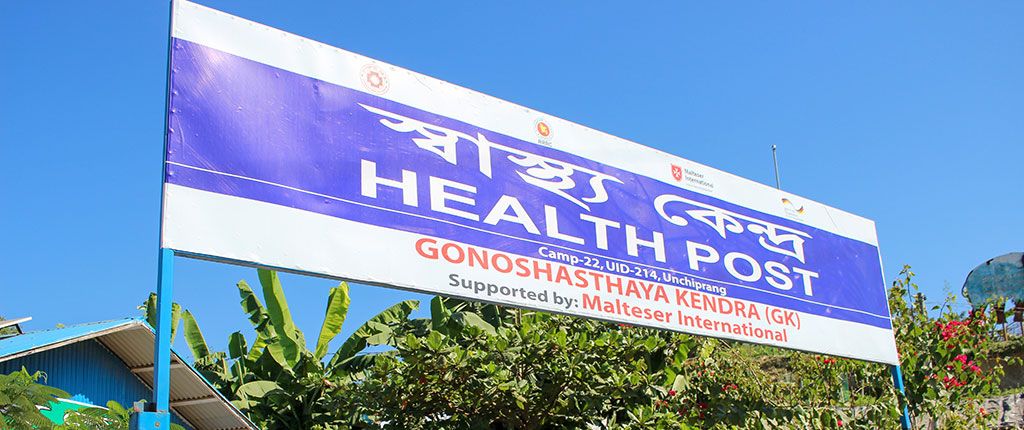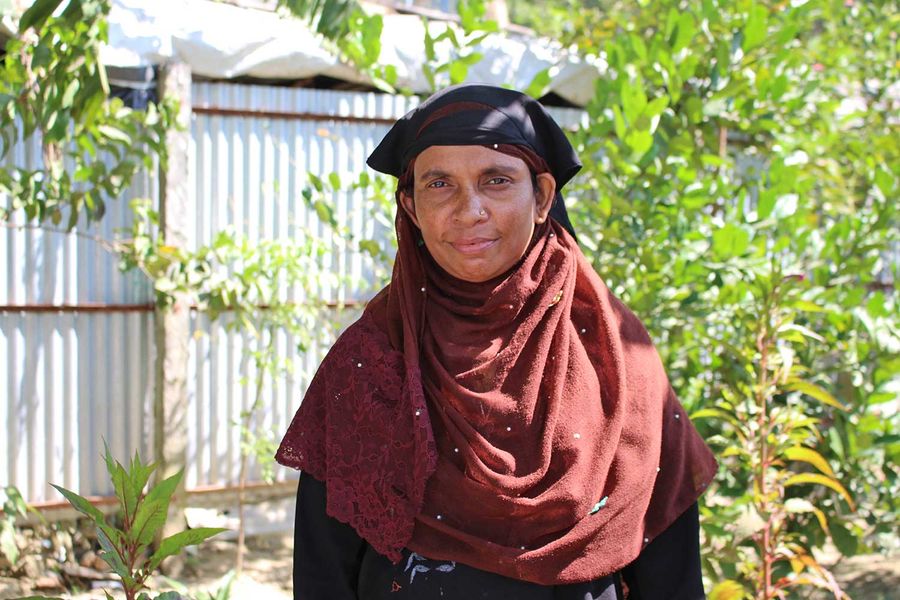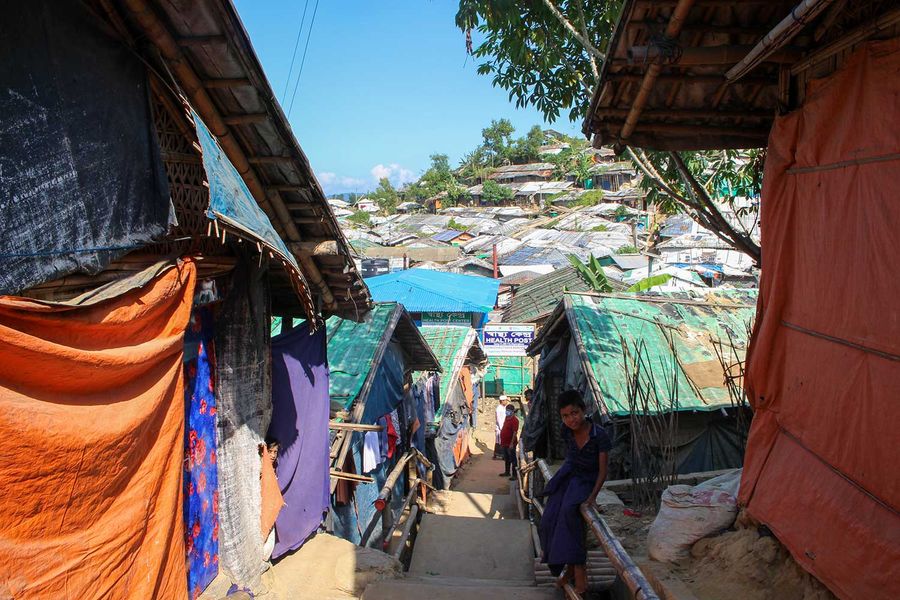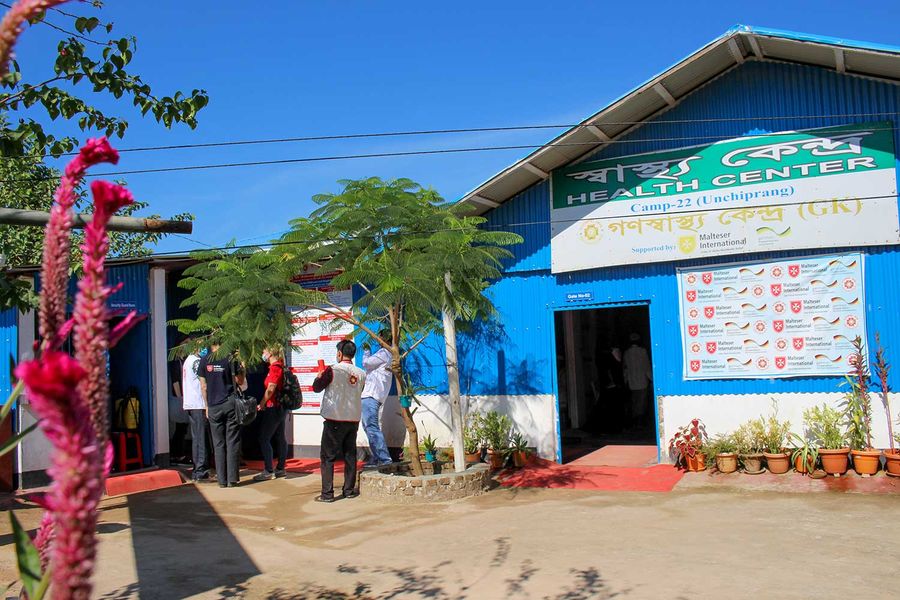
Community health worker Fatema in Bangladesh: "Serving my community motivates me"
"I assure the women that I am always available for them if they face any problems. Day and night, I will support them." - 50-year-old Fatema leaves no doubt: she will be there when a pregnant woman calls during the night because labor is starting or because she is experiencing complications. She tells this with pride and a smile on her lips that exposes her small gap between her teeth.

Fatema is one of about one hundred health workers of the three health posts Malteser International runs together with the local organization Gonoshasthaya Kendra (GK) in the world's largest refugee camp. The so-called "community health workers" make an indispensable difference for the health of the Rohingya, who live in refugee camps in the Cox's Bazar district in southern Bangladesh just a few kilometers away from their former homeland Myanmar.
Hundreds of thousands of shelters made of bamboo and tarpaulins have been built one after the other in the hilly area. Four years ago, the camp was quite gray and dusty. When the approximately one million people arrived within a few weeks in the summer of 2017 after the escalation of violence in Myanmar, the Bangladeshi government had the forests cut down, emergency shelters were erected quickly. Since then, many green plants have found their way between the shelters again.
Community health workers make important difference for health in refugee camps

Similarly, structures have grown in the health care sector in the camp over the past few years, which seem established and are leading to improvements of the still extremely difficult living conditions in the camp. The example of the community health workers shows that the refugee community itself plays an important and active part in this.
There are only very few times where the word "resilience" is more appropriate than in the case of these health workers. Like all the people in the camp, Fatema has experienced horrific things. "When I fled the violence to Bangladesh with my seven children in 2017, my husband stayed in Myanmar to take care of our property. We had many cows and other animals. After a few days, he was killed." And even in the camp, the challenges are huge. "Life is hard, but it's good to know that my family and I can come here to this health facility if we get sick, and that we get food from the World Food Programme. At least I don't have to worry about these basic things. There is no one in my family right now except me who is earning money."
Despite these traumatic experiences and limiting living conditions, Fatema remains strong - for her children and her community. She already knew the job as a health worker from Myanmar. Malteser International is also working there. Fatema was trained as a Traditional Birth Attendant by the team in Myanmar long before she fled. After her arrival in Bangladesh, she learned that she could contribute to the health of her community members in the refugee camp and earn a small income at the same time. "The money I earn from this work is very important. With it, I can buy food and clothes for my family, especially for my younger children," Fatema tells us. This is special because in Bangladesh, the Rohingya are denied the right to work, so there are hardly any official opportunities to earn a living. Working as a health worker is one of the few activities for the refugees in the camp that is allowed and for which there is an allowance.
“When I refer a pregnant woman to the hospital, I can't sleep at night.”

At the health post, which is run by our partner organization GK, Fatema received training as a "Sexual Reproductive Health Worker." "My main task is to approach pregnant women in the camp, talk to them and make them aware that they should go to the health facility for check-ups and consultations, such as nutritional counseling. I accompany the women through their pregnancy and pay attention, among other things, to whether a mother needs to take medication and whether or not she does so regularly," Fatema says. Many expectant mothers only learn through Fatema that they have the opportunity for free health services in the camp. "When women are in their last trimester, I talk to them about their plans, whether they want to deliver at home or in a health facility. In fact, we strongly recommend that they go to a hospital. Once the baby is born, my work continues: then I talk to the mother about how to breastfeed her baby, when to start complementary feeding, etc." Through this educational work during pregnancy, Fatema and her colleagues make an important contribution to mother-child health in the refugee camps.
Being there for her fellow community members who, like her, have experienced terrible things, motivates Fatema. She is a community health worker with heart and soul: "I visit the mothers regularly and call them to see how they are doing. When I refer a pregnant woman to the hospital, I can't sleep at night. I am especially happy when the baby is delivered without complications and both mother and child are healthy. I am very happy to be able to continue my work for this community."
(January 2022)
Our work in Bangladesh
In order to improve conditions for people in the overcrowded refugee camps, we have been on the ground since the beginning of the crisis, providing vital assistance in the areas of health, water, hygiene and nutrition for refugees and host communities. Thanks to the financial support of the German Federal Foreign Office and Aktion Deutschland Hilft e.V., we are able to enable the operation of three health stations of the Bangladeshi organization Gonoshasthaya Kendra (GK). In addition to the comprehensive financing of the health stations, we support the implementation as well as the administrative and technical management of the project in order to strengthen the capacities of our partner organization and to ensure the quality of the services.








